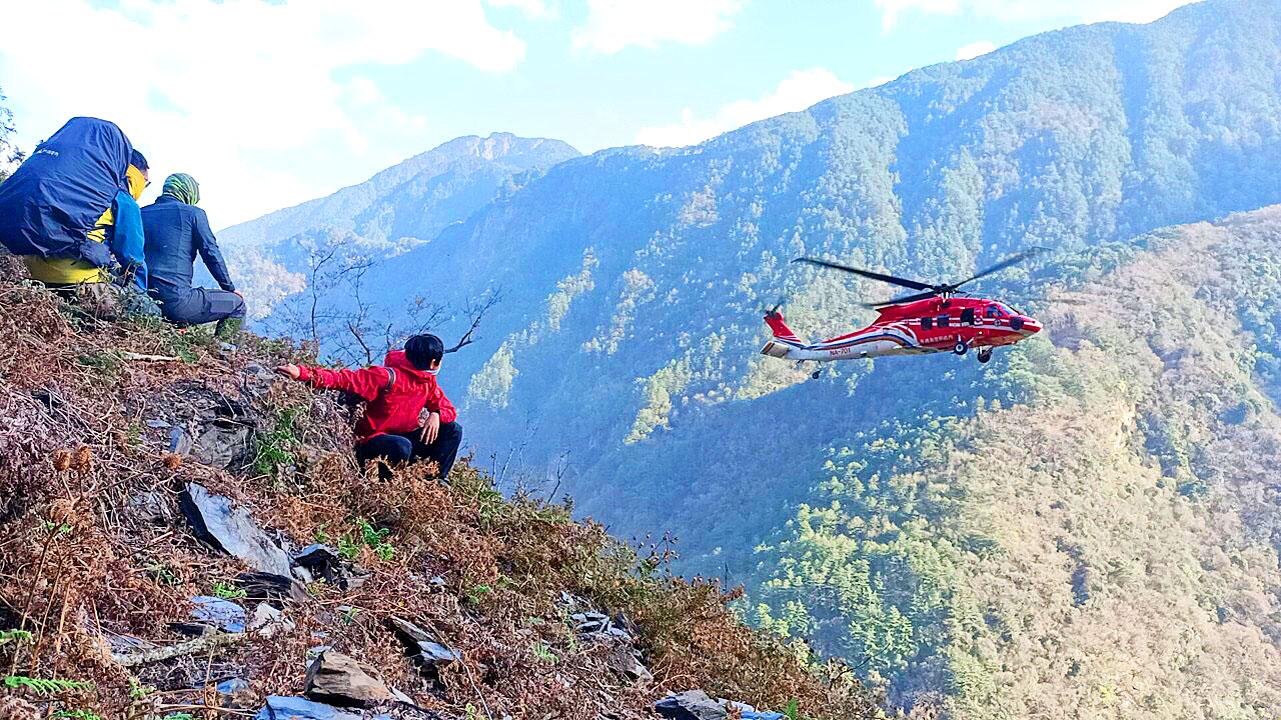The Ministry of the Interior might support fees for people who are rescued by air in mountainous areas after minor or preventable hiking accidents, the ministry told lawmakers on Thursday.
Minister of the Interior Hsu Kuo-yung (徐國勇) made the remark during a session of the legislature’s Internal Administration Committee in which lawmakers highlighted the rising number of medical evacuations conducted by the National Airborne Service Corps last year.
The corps last year conducted 453 rescue missions, a 39.7 percent rise from 2019, accounting for more than 17 hours of flight time, Democratic Progressive Party (DPP) Legislator Kuan Bi-ling (管碧玲) said, citing government records.

Photo copied by Liu Pin-chuan, Taipei Times
Most of them were due to hiking accidents, involving people who went to mountainous areas without a guide or sufficient preparation, she said.
The surge in domestic travel amid the COVID-19 pandemic might have contributed to the trend, Kuan said.
“While there should not be a general charge for the services, those who abuse them should pay for it,” she said.
DPP Legislator Lo Mei-ling (羅美玲) urged a user-pays principle, saying that this would help deter ill-prepared people from going into mountainous areas.
DPP Legislator Wang Mei-hui (王美惠) said that the government should draft a bill introducing fees for hikers who neglectfully necessiate rescue missions.
“People cannot knowingly go unprepared to the mountains and expect to be bailed out,” she said.
In response, Kuo said that the ministry supports proposals to charge people who need to be rescued after minor or preventable accidents due to insufficient preparation.
“They cannot call the corps to pick them up just because they feel dizzy,” he said.
Corps Captain Ching Yen-yuan (井延淵) said that the corps would discuss the issue with the National Fire Agency as well as other government departments involved in mountain search-and-rescue operations.
Rescuing a person by helicopter costs about NT$200,000, depending on the weather and terrain where an incident occurs, Ching said, adding that hikers usually do not cause rescue mission in easy terrain.
“Some search-and-rescue missions take two or three days. Sometimes specialists from other agencies have to be involved,” Ching said.

Taiwan is stepping up plans to create self-sufficient supply chains for combat drones and increase foreign orders from the US to counter China’s numerical superiority, a defense official said on Saturday. Commenting on condition of anonymity, the official said the nation’s armed forces are in agreement with US Admiral Samuel Paparo’s assessment that Taiwan’s military must be prepared to turn the nation’s waters into a “hellscape” for the Chinese People’s Liberation Army (PLA). Paparo, the commander of the US Indo-Pacific Command, reiterated the concept during a Congressional hearing in Washington on Wednesday. He first coined the term in a security conference last

Prosecutors today declined to say who was questioned regarding alleged forgery on petitions to recall Democratic Progressive Party (DPP) legislators, after Chinese-language media earlier reported that members of the Chinese Nationalist Party (KMT) Youth League were brought in for questioning. The Ministry of Justice Investigation Bureau confirmed that two people had been questioned, but did not disclose any further information about the ongoing investigation. KMT Youth League members Lee Hsiao-liang (李孝亮) and Liu Szu-yin (劉思吟) — who are leading the effort to recall DPP caucus chief executive Rosalia Wu (吳思瑤) and Legislator Wu Pei-yi (吳沛憶) — both posted on Facebook saying: “I

The Ministry of Economic Affairs has fined Taobao NT$1.2 million (US$36,912) for advertisements that exceed its approved business scope, requiring the Chinese e-commerce platform to make corrections in the first half of this year or its license may be revoked. Lawmakers have called for stricter enforcement of Chinese e-commerce platforms and measures to prevent China from laundering its goods through Taiwan in response to US President Donald Trump’s heavy tariffs on China. The Legislative Yuan’s Finance Committee met today to discuss policies to prevent China from dumping goods in Taiwan, inviting government agencies to report. Democratic Progressive Party Legislator Kuo Kuo-wen (郭國文) said

The Ministry of Economic Affairs has fined Taobao NT$1.2 million (US$36,900) for advertisements that exceeded its approved business scope and ordered the Chinese e-commerce platform to make corrections in the first half of this year or its license would be revoked. Lawmakers have called for stricter supervision of Chinese e-commerce platforms and more stringent measures to prevent China from laundering its goods through Taiwan as US President Donald Trump’s administration cracks down on origin laundering. The legislature’s Finance Committee yesterday met to discuss policies to prevent China from dumping goods in Taiwan, inviting government agencies to report on the matter. Democratic Progressive Party